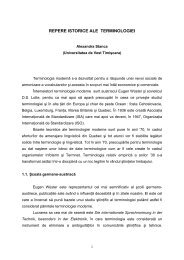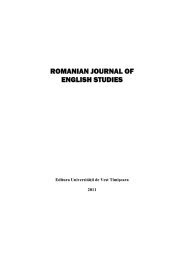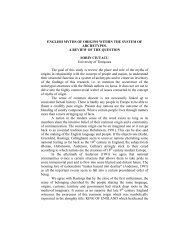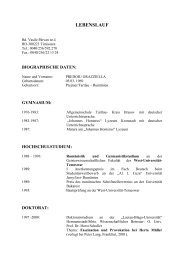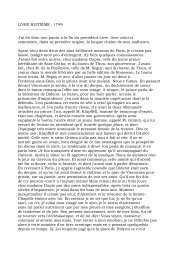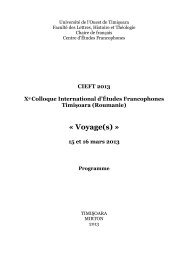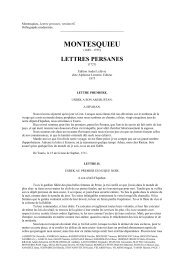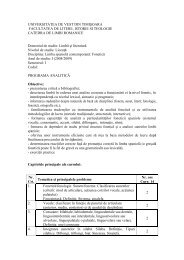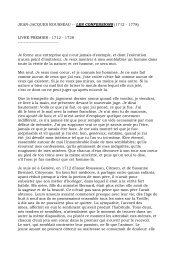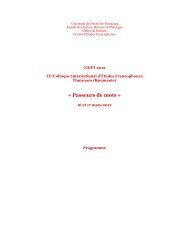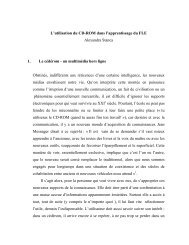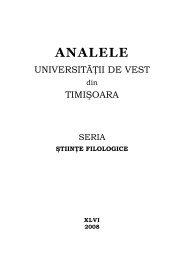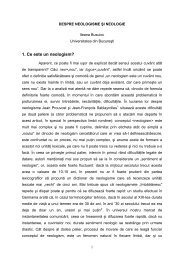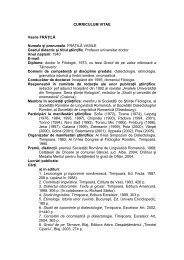TRANSLATION AND MEANING: A CULTURAL- COGNITIVE ...
TRANSLATION AND MEANING: A CULTURAL- COGNITIVE ...
TRANSLATION AND MEANING: A CULTURAL- COGNITIVE ...
You also want an ePaper? Increase the reach of your titles
YUMPU automatically turns print PDFs into web optimized ePapers that Google loves.
adaptation, perceived by the midcult public as an encounter with real art<br />
(Milton, 1997: 433).<br />
This brief analysis of the voluntary unreliability of the translator,<br />
particularly in the case of intersemiotic translation, has shown that there are<br />
different factors contributing to the choice for unfaithfulness. In broad lines,<br />
the adapter either wants to change the people’s attitude towards a text,<br />
gaining a new audience for it through the adaptation, or s/he wants to<br />
abandon the hidden position of a normal translator – who should be<br />
relatively invisible in the translation – by offering the new version as a valid<br />
interpretation of the original text. When the re-writing is achieved in a<br />
different type of medium, s/he will be allowed to show more creativity than<br />
the linguistically-bound translator. The two main consequences of this fact<br />
are that, on the one hand, the adapter tends to allow himself or herself more<br />
freedom from the original in terms of meaning production, on the other hand<br />
the result of the re-writing process may be a work of art that – at least at a<br />
superficial level – can claim its independence from the original altogether. If<br />
the purpose of the adapter is to present the new work as original creation,<br />
textual intervention will be more abusive (in terms of traditional translation<br />
practice), often starting with a change in the title of the original. In such<br />
cases only those familiar with the source text in greater detail are still able to<br />
identify it in the adaptation. This is the ultimate degree of translational<br />
unreliability and unfaithfulness, an exceptional situation, somewhere at the<br />
border between translation and pseudo-translation or original creation.<br />
As far as unreliability is concerned, intersemiotic translation is<br />
similar to the interlinguistic translations of the (in)famous belles infidèles<br />
type, for instance. If the latter are generally accepted as variants of their<br />
source texts, so intersemiotic translations must be accepted as translation<br />
instances in their own right and, if paraphrasing (or adapting) is in order, the<br />
stuff that culture is made of. The unreliability of the translators is then a<br />
quality that, on the one hand represents the __expression of the human need<br />
for imaginative, subjective, innovatory interactions with pre-existing<br />
cultural texts, and on the other hand accounts for the invariance and the<br />
change within the cultural matrix.<br />
References<br />
Álvarez, R., Vidal C.-A. M.(eds.). 1996. 'Translating: A Political Act' in Translation,<br />
Power, Subversion. Clevedon: Multilingual Matters.<br />
Baldick, C. 1990. The Concise Oxford Dictionary of Literary Terms. Oxford, New York:<br />
Oxford University Press.<br />
Baker, M. 1992. In Other Words. A Coursebook on Translation. London, New York:<br />
Routledge.



